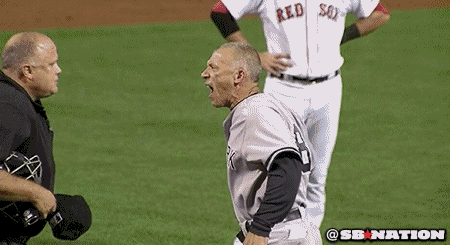
We moved four months ago, but the process still isn’t over. We never quite finished clearing out the garage and attic at our old place, but since new renters were set to move in on Sunday, we spent Saturday packing everything out and all day Sunday trying to find space in the new garage for all the stuff we had left behind. We still aren’t done, but at least we can see the light at the end of the tunnel.
So as the Yankees and Red Sox were squaring off for the final game of their three-game set at Fenway Park, I was knee deep in a sea of boxes and assorted debris covering my driveway. I had hoped to be done by the first pitch, hoped to be lying down on the couch enjoying a nine-inning reward for the day’s work, but as it was I was stuck listening to John Sterling and Suzyn Waldman.
Listening to a baseball game on the radio (or an iPhone, in this case), is a completely different experience than watching on TV. Baseball’s languid pace fits perfectly with radio, as most radio announcers are comfortable enough to let the game breathe and take on a life of its own. The twenty-second gap between pitches allows for choices; an announcer can weave elaborate stories with history and anecdotes in and around an at bat, or he might simply choose to let the ambiance of the ballpark filter through to the listener.
With Sterling and Waldman, there isn’t much ambiance. They tend to prattle on throughout the game, sometimes talking about the action on the field, other times remembering Broadway musicals from the 1950s, and so it was on Sunday night. F.P. Dempster was on the mound for the Red Sox, and although he gave up a double to the smoldering Robinson Canó in the first inning, the game didn’t get interesting until CC Sabathia toed the rubber in the bottom half.
Sabathia was good his last time out, but even at the time that looked more like an aberration than a correction, and the CC we’ve grown used to seeing was back on Sunday. He walked Jacoby Ellsbury to start the inning, then gave up a single to Shane Victorino before finally walking David Ortíz to load the bases with one out. After a sacrifice fly from Johnny Gomes and a single off the bat of Jarrod Saltalamacchia, the Sox were up by two.
But the game really started in the top of the second when Alex Rodríguez walked up to the plate. A-Rod has always been a polarizing figure, and he’s been accustomed to hearing boos in every ballpark, including his own, for the majority of his career, but it’s never been anything like this. With everything that’s been going on off the field for Alex (and things got even crazier on Sunday as general manager Brian Cashman revealed that he no longer talks to A-Rod because of legal concerns), his on-field appearances over the past two weeks (and the past three days in Boston) have been met with the loudest and most sustained booing that any baseball player has ever had to endure.
And so it was as A-Rod strode to the plate for his first at bat on Sunday night. With the boos raining down, F.P. Dempster threw his first pitch behind Rodríguez, and the boos immediately turned to cheers. Everyone in the park (except, apparently, home plate umpire Brian O’Nora) knew what was probably going on, and when F.P.’s next two pitches were aimed at A-Rod’s belt buckle, it was clear that he was doing his best to send a message. His fourth pitch was a bit higher and a bit tighter and drilled Alex in the arm.
As Fenway exploded with glee, O’Nora flew into action, warning F.P., the Boston dugout, the New York dugout, and a peanut vendor in the front row. Remember when George Brett flew out of the third-base dugout after being called out in the Pine Tar game? Joe Girardi’s reaction to O’Nora’s warning was pretty much identical. He sprinted out to engage O’Nora and was thrown out almost immediately. Sterling and Waldman were in complete disbelief over the entire scene, and they wondered aloud about why Girardi would’ve been ejected so quickly. “We know he didn’t swear at O’Nora,” explained Sterling, “because Girardi does not swear.”
When I finally got to watch the recording hours later, the video told a different story. Girardi was furious that F.P. hadn’t been thrown out, and even a novice lip reader would’ve had no trouble deciphering his words for O’Nora before and after being tossed: “You fucked up! You fucked up!” Next Girardi turned on Dempster and reviewed his performance: “That’s bullshit! You’re a fucking pussy!” (Buster Olney reported on Monday morning that Girardi probably tripled his career profanity total in those five minutes.)

I’ve never seen Girardi so angry, and I can’t say that I blame him. Not only did O’Nora fail to act, but he essentially condoned F.P. Dempster’s moral crusade. Apparently it’s now okay for a pitcher to throw at a player because he doesn’t like what he’s doing and saying off the field, but it’s no longer okay for a manager to defend his player. As several members of the media said in the moment and afterwards, if baseball doesn’t suspend F.P., they’ll be just as guilty as O’Nora.
So Rodríguez stood at first base, but even more important than that, his team stood united behind him. Players from both dugouts and bullpens had wandered out onto the field during the dispute, but it was clear that Yankee players were just as angry as their manager. A-Rod eventually came around to score after Curtis Granderson doubled him to third and Eduardo Núñez singled him home, and he received a hero’s welcome when he returned to the dugout. Even as members of the front office continue to distance themselves from Alex, his teammates seem to have embraced him. Just another item on the long list of contradictions concerning Mr. Rodríguez.
But back to the game. Lyle Overbay tied the game with a sacrifice fly, Sabathia had a quick and easy bottom of the second, and the Yankees went ahead 3-2 when A-Rod extracted a tiny bit of revenge (there would be more later) with an RBI groundout in the third.
Things started to look bleak almost immediately after that. Sabathia gave up a run to tie the score in the third, two more in the fourth, and then he walked in a sixth run in the fifth. I really don’t know what to say about Sabathia anymore.
In the top of the sixth, drama walked to the plate in the form of Alex Rodríguez. With F.P. Dempster still on the mound, A-Rod put a good swing on a 1-0 fastball and the boos suddenly went silent. It was the type of ball we’ve seen countless times from A-Rod over the past ten years, launched towards center field by a vicious swing but deceptive in its length. Ellsbury drifted back, but it quickly became clear that he wouldn’t have a play. He looked up and watched it soar deep into the night before settling several rows back in the bleachers, 446 feet from home plate.
It was a monster home run, but it meant much more than just a single run. The ball landed in the stands just as A-Rod rounded first, and the cameras caught him screaming in triumph and stealing a glance towards the mound. It wasn’t just about cutting the lead to 6-4; this was something personal. He sprinted around third, looked into the Yankee dugout, then paused for an extra second at home and did his best Big Papi impression, standing at the plate with two index fingers pointed skyward, either completely oblivious to the boos or soaking them in like warm sunshine. Needless to say, he was mobbed when he arrived back in the dugout. When asked afterwards about how he felt while rounding the bases, A-Rod didn’t hide behind any cliché about helping the team. His response was short and sweet: “It was awesome.”
But the Yankees didn’t stop there. It wasn’t long ago that a 6-3 deficit heading to the sixth inning would be too much of a mountain for the Yankees to climb, but no longer. They would load the bases with one out after Núñez and Overbay singled and Chris Stewart worked a walk, finally pushing F.P. Dempster from the game and bringing Brett Gardner to the plate. Gardner had been one of the more animated Yankees on the field after A-Rod’s beaning, so he might’ve been disappointed to be facing a reliever instead of the starter, but he still managed to punish F.P. He launched a shot to the gap in right center for a bases clearing triple that might’ve been an inside the parker if he hadn’t had to come to a complete stop near second when it looked like it might be caught, and suddenly the Yankees had a 7-6 lead.
Just as A-Rod had done at the beginning of the inning, Gardner let loose a scream as he dusted himself off at third. His triple might’ve come off of Drake Britton, but all the runs were charged to F.P. Dempster, a point that Gardner made after the game. “There’s no doubt what the guy was trying to do, but it is what it is, and he gave up seven runs today.” Those seven runs shouldn’t have been much of a surprise. F.P. has a career record against the Yankees of 0-6 and 7.57 — that’s not an airplane, that’s his ERA.
The Yanks added a run in the seventh (Mark Reynolds rapped a single to center to score Granderson) and another in the ninth (Stewart singled in Jayson Nix), and Mariano Rivera closed things down for a 9-6 win, but Sunday night was about Alex Rodríguez. As clueless as he sometimes can be, right now he seems to understand exactly what’s going on. (When a reporter asked afterwards if he thought F.P. should be suspended, Rodríguez chuckled and said, “I’m the last guy you should be asking about suspensions!”) He’s sitting in the eye of the storm that he created, but somehow he seems more comfortable than he ever has. Coming off a severe injury and an invasive surgery, fielding endless questions after every game, enduring barbs from his team’s front office, and facing hostile crowds every night, A-Rod is somehow playing the best baseball we’ve seen from him in two years.
Alex Rodríguez is the villain, and he likes it.




























